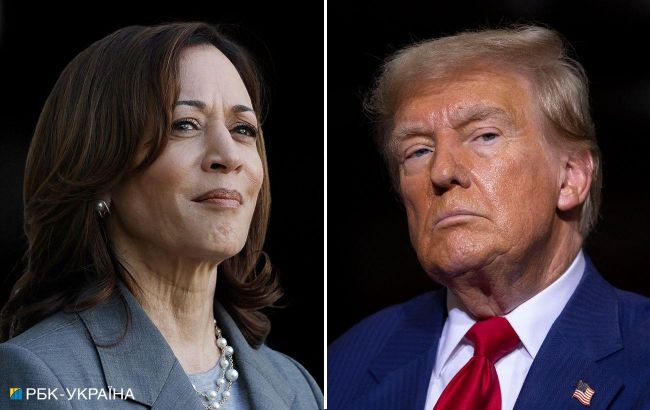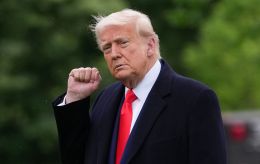Trump vs Harris: Why debates matter and what to expect from US presidential candidates
 Photo: Kamala Harris and Donald Trump to debate on September 10 (RBC-Ukraine collage)
Photo: Kamala Harris and Donald Trump to debate on September 10 (RBC-Ukraine collage)
This week, debates will be held between Kamala Harris and Donald Trump, candidates for the US presidency. The event promises to be interesting, even though most voters have already made up their minds.
Read more about the debates, what to expect from Trump and Harris, and whether their performance could significantly impact the ratings, in the material by RBC-Ukraine.
Contents
- When will the Trump-Harris debate take place
- Debate rules
- Why the Trump-Harris debate is important
- What to expect from the opponents
- Will the debate affect the ratings
When will the Trump-Harris debate take place
Harris and Trump will debate tomorrow, September 10, eight weeks before the US presidential election. The candidates are preparing for a confrontation, which is the only scheduled presidential debate.
Last week, Harris stated that her preparation was going very well following a campaign event in New Hampshire. In an interview with The Pulse of NH radio, her opponent said that he had been preparing for this debate all his life.
For more details on the preparation, read the material by RBC-Ukraine.
The debate will air on ABC News at the National Constitution Center in Philadelphia. It will last 90 minutes with two commercial breaks. The start time is 9:00 PM local time.
The moderators will be anchors David Muir and Linsey Davis. The live broadcast will be available on ABC News Live, Disney+, Hulu, and the ABC.com website.
Debate rules
After a week of disputes, Kamala Harris agreed to follow the rules of the June debates, where each candidate's microphone will be turned off while the opponent is speaking.
The Vice President's team had insisted on keeping the microphones on at all times, which is usually typical for presidential debates (the summer debate between Trump and Joe Biden was an exception). Hot microphones would have allowed opponents to challenge each other, and Harris could have provoked Trump into excessive outbursts on national TV.
The candidates will be provided with pens, notepads, and bottles of water. Other props and pre-prepared notes are prohibited.
There will be no opening statements. Trump won the draw to determine the order of closing statements. The former President chose to make a final statement after Harris. The Vice President will speak from the podium on the right side of the screen for viewers.
Harris and Trump will each have two minutes for responses, two minutes for rebuttals, and one minute for additional comments, responses to rebuttals, or clarifications. Each candidate will have two minutes for their final statements. They will not be able to ask questions of each other or interact with their campaign teams during commercial breaks.
Why the Trump-Harris debate is important
Tomorrow's showdown will be a significant test for both candidates. Many are eagerly anticipating how Kamala Harris, known for her prosecutorial reputation, will hold her Republican opponent accountable for his unprecedented criminal past and contrast the critical challenges facing the United States.
The importance of the debate is clearly demonstrated by what followed the June broadcast. President Joe Biden's uncertain performance ultimately led to his withdrawal from the presidential race and the replacement of the Democratic Party candidate with Kamala Harris. "It will be important because these two candidates have such a different promise and vision for America's future," said Christina Harvey, Executive Director of Stand Up America ( a liberal-leaning voting rights group).
Vladyslav Faraponov, head of the Institute of American Studies and an analyst at Internews-Ukraine, emphasizes that tomorrow will be the first direct face-to-face debate. This is a significant public challenge for Harris since she became a candidate.
"Previously, she only gave interviews. Even her speech at the Democratic convention was for a loyal audience, not in front of opponents under strict rules. So, in principle, the debates should be interesting. This is one of those cases where you might hear something new. Because Harris has provided little basis for assessing her domestic and foreign policies, etc.," he told RBC-Ukraine.
As for Trump, the debate is crucial for him because his ratings have declined since Harris was nominated. Tomorrow, he will have the opportunity to show US voters what she is doing wrong.
What to expect from the opponents
According to Faraponov, in tomorrow's debate, Donald Trump will attempt to balance between praising himself and attacking his opponent. Kamala Harris, on the other hand, will focus more on her own ideas and vision and will pay less attention to Trump.
“There’s already been enough focus on Trump at the Democratic convention. Let’s say, her supporters are unlikely to be interested in hearing about Trump. They are more likely to support her not because they are against Trump. Although there is certainly a segment of voters who are,” noted the interlocutor.
It is also possible that Trump will personally attack Harris, as he did even during the Republican primaries, sometimes inventing blatant nonsense about his opponents.
“What kind of rhetoric am I expecting from him? Perhaps, on foreign policy, there will be a narrative that only he can prevent World War III. That he will communicate with Vladimir Putin and Xi Jinping. But I still lean towards the idea that the debate will mainly be about domestic policy and personalities,” added the expert.
Will the debate affect the ratings
With two months until the election, Trump and Harris's ratings have effectively equalized. According to polls by NYT and Siena College, Donald Trump’s average rating is one percentage point higher - 48% versus 47%. However, the difference falls within a 3% margin of error.
Trump’s electoral base is largely stable. Only 9% of respondents said they needed more information about the Republican candidate, while 28% said the same about Harris.
According to a USA Today/Suffolk Poll survey, 90% of voters are confident in their choice. About 8% said they might still change their minds, and around 1% are undecided.
According to a CNN/SSRS poll, Harris slightly leads Trump in key states, including Wisconsin, Georgia, Michigan, and Nevada. However, the advantage is minimal and within the margin of error. In Pennsylvania, both candidates have 47%, while Trump leads by 5% in Arizona.
Generally, debates do not change the course of events for those watching the broadcast. But even a small number of voters who are skeptical of both candidates might decide to make a different choice based on tomorrow's broadcast. “In a close election, everything matters. Even more so, it's going to be them talking to their bases and trying to build that enthusiasm to vote, something that has been lacking for the Democratic campaign, but has been gaining steadily since Harris has taken over as the nominee,” says Mark Trussler, Director of data science at the University of Pennsylvania's program on opinion research and election studies.
Vladyslav Faraponov does not see any significant chance that the debate will notably impact the ratings.
“Although if Harris starts saying something unpopular and unclear to a wide audience, it might distract literally a few percent. And that could be enough for Trump to hope for a better result in swing states, where the fight is for tenths of a percent. I think that will be his strategy for September,” he emphasized.
Sources: materials from Politico, The New York Times, USA Today, Bloomberg, CNN, and comments from Vladyslav Faraponov, head of the Institute of American Studies and analyst at Internews-Ukraine.

